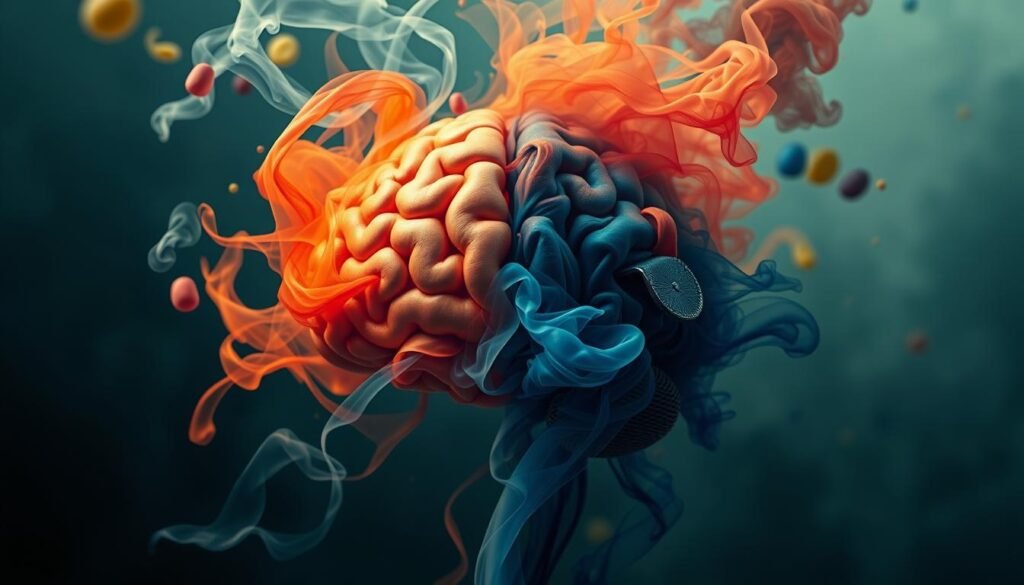Over 30% of Americans will face an anxiety disorder at some point. This fact highlights how common anxiety is, affecting 40 million people in the U.S. annually. The link between nicotine and anxiety is important to explore, as many people use nicotine to ease their anxiety. Yet, it’s vital to realize how nicotine can long-term affect anxiety levels. This is especially true since smokers have a higher chance of having anxiety disorders.
This piece looks at nicotine’s dual effects. On one hand, it can offer temporary relief from anxiety. On the other, it may lead to chronic anxiety problems. With millions battling anxiety disorders and nicotine addiction, it’s crucial to understand their interaction. We’ll discuss how nicotine affects the mind and its role in our daily lives.
Key Takeaways
- Over 40 million Americans are affected by anxiety disorders.
- Approximately 45% of individuals with severe anxiety reported using tobacco.
- Nicotine use is prevalent among those with anxiety disorders, with 22% of smokers affected.
- The relationship between nicotine and anxiety is complex and multifaceted.
- Withdrawal from nicotine can induce severe anxiety symptoms.
- Many people experience lower anxiety levels after quitting nicotine.
Understanding Anxiety Disorders
Anxiety disorders include different mental health issues. They majorly affect daily life in the United States. About 40 million adults in the U.S. are hit by anxiety each year. Disorders like generalized anxiety disorder, panic disorder, and PTSD are part of this group. It’s important to understand them. This helps in knowing how elements like nicotine may worsen anxiety problems.
Prevalence of Anxiety Disorders in the U.S.
Anxiety issues are a big health problem in the U.S. Each year, 18% of adults face anxiety disorders. This fact underlines how common these issues are. It pushes for more awareness and research into their causes and treatment.
Common Symptoms of Anxiety Disorders
People with anxiety may show different signs. These can be emotional, cognitive, or physical.
- Excessive worry about various life aspects
- Avoidance behaviors that stop them from taking part in certain events
- Irritability and restlessness that affect daily tasks
- Insomnia or trouble sleeping that hurts health
- Increased heart rate and muscle tension, showing panic or anxiety attacks
Noticing these symptoms is critical. They harm personal health. And they can mix with lifestyle choices, like smoking or using nicotine.
What is Nicotine?
Nicotine is an addictive stimulant found mainly in tobacco. It’s also getting more common in vaping devices. To know what nicotine is, we need to examine where it comes from and how it affects the brain.
Sources of Nicotine
The main sources of nicotine are:
- Cigarettes
- Cigars
- Chewing tobacco
- Vaping devices and e-cigarettes
- Nicotine gum and patches

Nicotine’s Mechanism of Action in the Brain
Nicotine works by interacting with the brain’s receptors. When you smoke or chew, nicotine hits the brain fast, in about ten seconds. It sticks to certain receptors.
Then, it releases neurotransmitters like dopamine. Dopamine makes you feel good, but only for a short while. This makes the brain want more nicotine, leading to dependency.
| Sources of Nicotine | Mode of Delivery | Duration to Effect |
|---|---|---|
| Cigarettes | Inhalation | ~10 seconds |
| Cigars | Inhalation | ~10 seconds |
| Chewing tobacco | Oral | ~30 minutes |
| Vaping devices | Inhalation | ~10 seconds |
| Nicotine gum | Oral | ~20 minutes |
| Nicotine patches | Transdermal | ~1-2 hours |
It’s important to understand where nicotine comes from and how it works. This helps us see its effects on mental health, especially tied to anxiety disorders.
The Relationship Between Nicotine and Anxiety
Nicotine and anxiety interact in complex ways. Studies show that nicotine can both soothe and worsen anxiety symptoms. This connection is crucial for understanding its impact on mental health.
How Nicotine Affects Anxiety Symptoms
Nicotine can temporarily relieve anxiety by boosting pleasure chemicals in the brain. This makes people feel better for a short time. But, long-term nicotine use can backfire.
Regular smokers often feel more anxious over time. For those with mental health issues, nicotine can make anxiety, stress, and depression worse.
The Role of Nicotinic Acetylcholine Receptors (nAChRs)
Nicotinic acetylcholine receptors (nAChRs) have a big role in how nicotine affects anxiety. Nicotine attaching to these receptors changes mood states. How it does this depends on the dose and how often one uses nicotine.
Finding out how different nAChR types impact this process could help create better treatments. Researching this is key.
Does Nicotine Cause Anxiety?
The link between nicotine and anxiety is complex but worth understanding. At first, nicotine can seem like it helps with anxiety. It acts like a stress reliever. People feel calm right after using it. This is because nicotine makes the brain release dopamine. This chemical makes us feel good briefly, hiding the anxiety for a little while.
Short-term Anxiolytic Effects of Nicotine
Many people smoke to deal with anxiety. It’s key to know that those with depression are more likely to smoke. Smokers dealing with anxiety or depression tend to smoke a lot. This creates a harmful loop. Nicotine might give quick relief from anxiety, but it leads to more anxiety and restlessness over time.
Long-term Effects and Nicotine Withdrawal
When people depend on nicotine, quitting brings withdrawal symptoms. These include more anxiety and depression. Withdrawal symptoms make anxiety worse, especially on the second or third day without nicotine. This brings us to wonder if nicotine causes anxiety. Nicotine addiction affects mental health deeply. Smokers with mental health issues might have a harder time quitting. They could need more medication to help with anxiety and depression. Quitting smoking plays a big role in improving mental health.

| Effect | Details |
|---|---|
| Short-term Relief | Dopamine release provides temporary calm, but effects are fleeting. |
| Increased Dependency | Users often smoke to cope, reinforcing reliance on nicotine. |
| Withdrawal Symptoms | Heightened anxiety and depression increase during quitting. |
| Cyclical Pattern | Anxiety may intensify in cycles based on nicotine use and withdrawal. |
| Benefits of Quitting | Improved quality of life and reduced anxiety observed post-cession. |
Nicotine-Induced Anxiety: A Double-Edged Sword
The link between nicotine and anxiety isn’t simple. It depends on many things. Differences in our genes, mental health issues, and where we use nicotine matter a lot. Understanding these can help us know why nicotine affects people differently.
Factors Influencing Nicotine’s Impact on Anxiety
Many things play into how nicotine changes anxiety levels. These include:
- Genetics: Our genetic makeup changes how we feel anxiety and react to nicotine.
- Psychological Conditions: If someone already has mental health problems, nicotine might make their anxiety worse.
- Usage Context: Using nicotine alone or with friends can also change its effect on us.
Animal Studies and Their Implications for Human Anxiety
Studies on animals give us clues about nicotine and anxiety. They show different ways of using nicotine, brain parts involved, and how long exposure lasts can affect anxiety. This suggests anxiety control might depend more on the person than the nicotine alone. These animal studies help us better understand anxiety in people who smoke or use nicotine products.

Nicotine Consumption and its Association with Anxiety Levels
The link between using nicotine and feeling anxious is complex and impacts many people. Studies show that those who feel anxious may use nicotine for relief. This starts a harmful cycle that worsens their mental health.
Data on Smoking and Anxiety Disorders
Many studies look at the connection between smoking and anxiety. For instance, about 30% of people over 12 in the U.S. have used tobacco in the past month. Around 38% of U.S. cigarette use comes from people with a mental illness. Smoking is much more common in people with behavioral health issues, 23%, compared to the 14% national average for adults without these issues.
Statistics say 81% of young people using e-cigarettes do it to deal with stress, anxiety, or depression. About half of those who vape a lot use it as a way to handle anxiety. Those who stop vaping often feel better, with 90% reporting less stress, anxiety, or depression.
The Negative Feedback Loop of Nicotine Use
Using nicotine and feeling anxious can become a vicious cycle. When people smoke or vape to feel less anxious, their body craves nicotine more. Not having nicotine makes their anxiety worse, making withdrawal tough. Those who have anxiety and depression tend to smoke more, showing they may depend on it more.
Nicotine has been marketed as a stress reliever for a long time. This appeals to people with mental health issues who look for quick relief by smoking or vaping. However, quitting can actually decrease anxiety, highlighting the need to beat this addiction for better mental wellness.
| Statistic | Percentage/Rate |
|---|---|
| Adults with behavioral health disorders who smoke | 23% |
| Cigarette consumption by adults with mental illness | 38% |
| Young e-cigarette users starting for stress relief | 81% |
| Frequent vapers needing to vape for anxiety relief | 50.3% |
| Individuals feeling less anxiety after quitting vaping | 90% |
Impacts of Quitting Nicotine on Anxiety
Quitting nicotine is a mix of early struggles and later benefits. In the beginning, many people feel more anxious. This difficulty is part of quitting and is strongest in the first week. Symptoms like feeling anxious, sad, restless, and grumpy happen as the body adjusts to no nicotine.
Withdrawal Symptoms and Anxiety
When you stop using nicotine, anxiety is common, especially early on. Many feel that withdrawal makes them very upset. Research shows only 3 to 5 out of 100 people can quit smoking “cold turkey”. This shows how hard it is. During this time, headaches, anxiety, and trouble sleeping are common.
Long-term Benefits of Quitting
But quitting nicotine has big long-term benefits. Studies say that people who stop using nicotine feel less stressed, anxious, and depressed than those who don’t. A review of 26 studies found quitting smoking improves your mood and life quality. Also, 90% of young people who stopped vaping felt less anxious and stressed afterwards.
To deal with quitting, support and programs help. Slowly stopping may make it easier and help fight off withdrawal symptoms. The goal is clear: despite early troubles, quitting leads to a healthier, happier mindset.
| Study/Survey | Findings |
|---|---|
| 2014 Review of 26 Studies | Quitting smoking correlates with lower stress, anxiety, and depression levels. |
| Truth Initiative Survey | 90% of young quitters reported reduced stress and anxiety. |
| 2021 Truth Initiative Survey | 80% started vaping to alleviate anxiety or depression. |
| Randomized Clinical Trial | Young adults had 40% higher odds of quitting using “This is Quitting” program. |
| Withdrawal Symptoms Study | Symptoms peak during the first week but lessen after a month. |
Managing Anxiety During Nicotine Withdrawal
Quitting smoking is a big win, but it can cause anxiety from withdrawal symptoms. It’s crucial to handle this anxiety well to quit for good. The start of quitting can be tough, with symptoms and anxiety at their highest. Using different ways to cope can make this time easier.
Effective Strategies to Cope with Withdrawal Anxiety
There are a few tips that really help with nicotine withdrawal. They include:
- Physical Activity: Exercise helps relieve stress and improves mood. It also lowers anxiety and depression.
- Mindfulness and Relaxation Techniques: Meditation, deep breathing, and yoga can calm anxiety and help control emotions.
- Healthy Eating: Eating right supports your body, eases symptoms, and boosts your mood.
- Stay Hydrated: Drinking water helps detox the body and can lessen irritability.
Following these steps can really help with managing anxiety during withdrawal.
The Importance of Support and Professional Help
Getting support while quitting smoking is key. Talking to friends, family, and joining support groups reduces loneliness. Meeting people who are also quitting can be inspiring and supportive.
Seeing a therapist can also be very helpful. They specialize in dealing with addiction and anxiety. Plus, nicotine replacement therapies can lower cravings, helping you quit more successfully.
To summarize, handling withdrawal anxiety well means combining personal tips with strong support networks. Focusing on physical and mental health boosts your quitting success. With the right strategies and support from others, beating these challenges and quitting for good is totally achievable.
Conclusion
The link between nicotine and anxiety is complex. It gives short-term relief but might worsen anxiety over time. Many people with anxiety smoke, thinking it helps them cope. This makes us ask: does nicotine cause anxiety?
Research shows a worrying pattern among smokers, especially those with anxiety. For example, young smokers are more likely to develop panic disorders later. Nicotine addiction also increases the risk of anxiety in both sexes. These facts highlight the need for caution in using nicotine to manage anxiety.
Understanding nicotine’s double-edged sword is key to making healthy choices. With many smokers also facing anxiety, it’s important to think about nicotine’s pros and cons. This way, people can wisely manage its impact on their mental health.